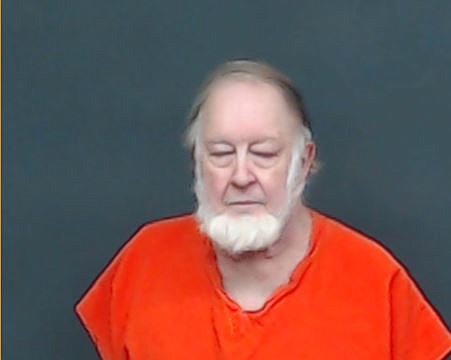A federal judge in Texarkana ordered an 18-month prison term Thursday for a retired Army veteran and convicted felon from whom more than a hundred guns and thousands of rounds of ammunition were seized last year.
Robert D. Whittington III, 78, appeared for sentencing before U.S. District Judge Robert Schroeder III in Texarkana's downtown federal building with Texarkana lawyer David Crisp. Whittington is a retired lieutenant colonel and author of several books about guns who served time in a Louisiana prison for felony terrorizing, court records show. Whittington pleaded guilty Jan. 3, 2011, and received a five-year term at a sentencing hearing March 9, 2011. He was released in November 2012, Crisp said at the hearing Thursday.
Whittington posted a letter at a deer camp in Louisiana threatening to come after the camp's owner while in a deer stand. A threatening letter was also mailed to the camp owner's home.
Federal agents seized at least 118 guns and 20,908 rounds of various types of ammunition March 7, 2018, from Whittington's home on Avenue D in Hooks, Texas. Whittington pleaded guilty in October to both counts listed in an indictment charging him with possession of firearms by a felon and possession of ammunition by a felon in anticipation of receiving a three-month term of probation.
Schroeder said Thursday that he elicited data from the U.S. sentencing commission concerning the results of cases similar to Whittington's and said, "Probation is an incredibly rare thing," for the criminal offenses Whittington committed.
Schroeder noted that Whittington's case calls for incarceration between 37 and 46 months under federal sentencing guidelines and said probation is "not appropriate."
"I looked at a fair amount of material from the sentencing commission," Schroeder said. "I spent a good deal of time trying to be fair to you."
Schroeder rejected the plea deal for probation and a new agreement including time behind bars was agreed to last month. Schroeder approved the 18-month plea sentence and ordered Whittington to participate in mental health treatment and an anger management program while in the Bureau of Prisons.
Crisp chronicled some of Whittington's military accomplishments, including two Bronze Stars while serving in Vietnam, numerous other medals and commendations, his service at Red River Army Depot and his work authoring books and papers about firearms.
"This collection was not an arsenal for criminal purposes. It was collected over a lifetime," Crisp said.
Schroeder said that he "acknowledges and respects" Robert Whittington's service and many accomplishments but said his significant criminal history is "troubling as well."
"You are of advanced age so I was surprised to see that much of your criminal conduct is recent," Schroeder said. "That's unusual. It stands out about you."
Schroeder mentioned the difficulties Whittington's penchant for letter writing has created in his life.
"It may be anger management for you but it has gotten you into some trouble and is a habit, perhaps, you should curtail," Schroeder said.
Schroeder told Robert Whittington he wants to be clear "so there is no mistake or misunderstanding" that he is not to have access to firearms or other dangerous weapons.
Following Robert Whittington's first guilty plea in October, the government filed notice of its intent to seek forfeiture of the sizable gun collection and ammunition stockpile. Crisp filed a petition on behalf of 88-year-old Dorothy Whittington, Robert Whittington's wife, asking that she be allowed to keep the proceeds of a sale of the guns and that the funds will be deposited in an account over which she has sole control.
The petition states that Robert Whittington previously deeded his interest in the firearm collection to his wife in 1996.
An affidavit signed by Dorothy Whittington and attached as an exhibit to the petition states that Robert Whittington told her he received a pardon from the governor of Louisiana after he served his five-year prison sentence for terrorizing and that she was unaware that it was illegal for Robert Whittington to reside in her Hooks, Texas, home, where the guns were stored.
Dorothy Whittington's affidavit alleges she and Robert Whittington bought the firearms as an investment vehicle.
Also attached as an exhibit is an alleged deed, handwritten and dated May 28, 1996, which conveys Robert Whittington's interest in the gun collection to Dorothy Whittington. However, the deed is dated March 29, 2018, and includes a statement that the original document was signed May 28, 1996. A copy of the alleged original deed is not included in the exhibits.
The government is seeking to conduct discovery, or the exchange of evidence, prior to a hearing to address whether Dorothy Whittington is the true owner of the guns. In a court filing, Assistant U.S. Attorney Jim Noble describes the documents provided by the defense as "dubious" and notes that it is clear from Alcohol Tobbacco and Firearms records that Robert Whittington himself purchased many of the guns himself after 1996.
Schroeder asked Noble and Crisp to confer and agree on the parameters of discovery, or the exchange of evidence, that needs to take place in advance of an ancillary hearing to address the government's forfeiture motion and Dorothy Whittington's claim of ownership of the firearms and ammunition. Schroeder encouraged the lawyers to move quickly as Robert Whittington may need to testify at such a hearing and is scheduled to self-surrender to the Bureau of Prisons to begin serving his sentence June 3.
Crisp lamented the sentencing as a "sad day" for the Whittingtons.
"It is hoped that both he and his wife will survive to see the end of his confinement," Crisp said. "Obviously they are hopeful that his lifetime record of exemplary service to his country and his community will not be defined by today's court proceedings."

